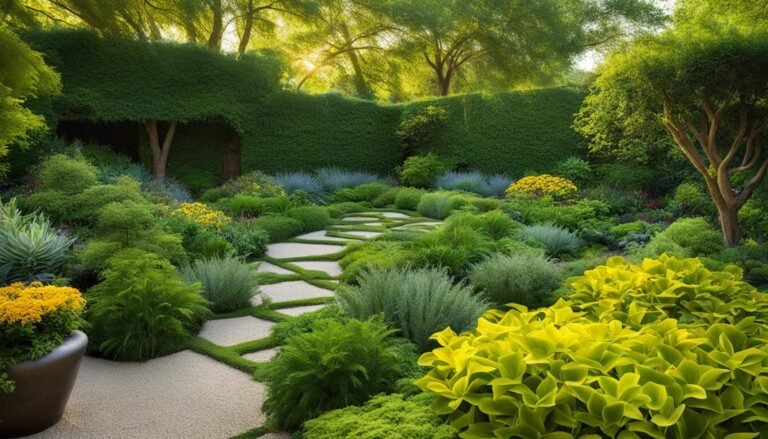As a homeowner, I’ve always treasured my outdoor space. It’s where I unwind after a long day, host memorable gatherings with friends and family, and enjoy the simple pleasure of reconnecting with nature. But one thing I’ve always yearned for is a sense of privacy, a cozy sanctuary where I can truly escape the hustle and bustle of the outside world.
That’s when I stumbled upon the idea of using plants as natural screens to create privacy in my backyard. I realized that landscaping with plants not only adds beauty and greenery to my surroundings but also provides a practical and aesthetically pleasing solution to my privacy needs. It was a game-changer!
I wanted to explore the world of screening plants and find unique ideas that would not only shield my outdoor oasis from prying eyes but also add charm and character to my garden. And let me tell you, the possibilities are endless!
From fast-growing plants that quickly envelop your space in lush foliage to evergreen shrubs that provide year-round screening, there are numerous options to suit every gardening style and preference. Whether you’re looking for a semi-transparent screen that allows a filtered view or a dense green wall that protects from all angles, there’s a perfect plant waiting for you.
In this article, I’ll take you on a journey to discover the best screening plant ideas for privacy. Not only will you find inspiration for creating your own private haven, but I’ll also provide practical tips and advice on choosing the right plants and maintaining them for optimal growth.
So, let’s dive in and unearth the secrets of landscaping with plants to create privacy screens that are as beautiful as they are functional!
Key Takeaways:
- Landscaping with plants can provide a beautiful and practical solution for creating privacy in your outdoor space.
- Fast-growing plants and evergreen shrubs are great options for quick and year-round screening.
- Choose plants that suit your gardening style and preference, whether you prefer a semi-transparent screen or a dense green wall.
- Stay tuned for practical tips and advice on selecting, planting, and maintaining screening plants for optimal growth.
- Transform your outdoor space into a private haven that blends aesthetic appeal with functionality.
Fast Growing Plants for Privacy Considerations
When it comes to creating privacy in your outdoor space, choosing the right fast-growing plants is essential. These plants not only provide the privacy you desire but also establish a lush and green environment in a shorter amount of time. However, it’s important to consider several factors when selecting privacy plants in order to ensure a successful outcome.
First and foremost, consider the style of your garden. Are you going for a formal and structured look or a more natural and organic aesthetic? Different plants have different growth habits and appearances, so it’s important to choose plants that complement the overall design and feel of your garden.
Another consideration is the need to hide ugly features in your yard. Whether it’s an unsightly fence, a utility box, or a neighboring eyesore, fast-growing plants can effectively conceal these unappealing elements and create a more pleasant view.
Furthermore, think about how you want to define different areas within your yard. Maybe you want to create separate zones for lounging, dining, and gardening. Fast-growing privacy plants can help delineate these spaces, adding structure and visual interest to your outdoor oasis.
Lastly, if you have a desire to create a private plot within your garden, fast-growing plants can help you achieve this goal. By selecting plants that grow quickly and densely, you can create a secluded and intimate area that is shielded from prying eyes.
When choosing fast-growing plants for privacy, it’s important to avoid species that may become invasive and cause long-term issues. Look for plants that are known to have controlled growth patterns and won’t take over your entire garden.
Remember, fast-growing plants for privacy can be a beautiful addition to your outdoor space, but it’s crucial to consider your specific needs and preferences. By selecting the right plants and taking these considerations into account, you can create a private and serene environment that enhances the beauty of your garden.
Benefits of Fast Growing Plants for Privacy:
- Rapidly establish a private and enclosed space
- Add lushness and greenery to your garden
- Conceal unappealing features and eyesores
- Create distinct zones within your yard
- Enhance the overall aesthetic of your outdoor space
Fastest Growing Privacy Plants
| Plant Name | Average Growth Rate | Height at Maturity | Preferred Climate |
|---|---|---|---|
| Arborvitae (Thuja occidentalis) | 2-3 feet per year | 20-30 feet | Hardiness zones 3-8 |
| Bamboo (Bambusoideae) | 3-5 feet per year | 10-50 feet | Hardiness zones 5-10 |
| Skip Laurel (Prunus laurocerasus) | 2-3 feet per year | 8-12 feet | Hardiness zones 6-9 |
When choosing fast-growing plants for privacy, keep in mind that different plants have specific growth rates and may require varying levels of care. Consider your specific climate and growing conditions to ensure the success of your privacy plants.
50 Best Plants for Privacy to Grow in Your Backyard
Creating a private and tranquil space in your backyard is crucial for enjoying outdoor activities without prying eyes. To help you achieve the perfect backyard privacy, I have curated a list of the 50 best plants for privacy. Whether you have a small patio or a vast garden, there’s a plant on this list to suit your needs. From lush evergreens to flowering shrubs, you’ll find a variety of options to transform your backyard into a secluded haven.
1. Arborvitae
The Arborvitae is a popular choice for privacy due to its dense foliage and tall, narrow growth habit. It forms a beautiful, green screen and can be easily pruned to maintain its desired height.
2. Bamboo
Bamboo is a fast-growing plant that can create a lush and exotic privacy screen. It comes in various sizes and colors, providing a versatile option for different garden styles.
3. Skip Laurel
Skip Laurel is an evergreen shrub that grows quickly and forms a dense screen. Its glossy leaves and white flowers add beauty to your backyard while ensuring privacy.
4. Holly
Holly plants offer both privacy and visual interest with their vibrant berries and glossy leaves. Various holly species are available, including both evergreen and deciduous varieties.
5. Boxwood
Boxwood is a classic choice for creating privacy hedges. Its compact growth habit and year-round foliage make it an ideal plant for sculpting into different shapes.

… (continue listing the remaining plants up to number 50)
By incorporating these plants into your backyard, you can enjoy the peace and tranquility of a private outdoor space. Whether you prefer the lushness of bamboo, the elegance of holly, or the versatility of boxwood, there’s a plant on this list that will suit your aesthetic preferences and climate.
| Plant Name | Family | Growth Habit | Height | Sunlight Requirements |
|---|---|---|---|---|
| Arborvitae | Cupressaceae | Evergreen | Up to 30 feet | Full Sun to Partial Shade |
With this comprehensive list, you have plenty of options to choose from when it comes to selecting the best plants for privacy in your backyard. Consider the specific needs of your garden, climate, and aesthetic preferences, and enjoy the benefits of a private and serene outdoor oasis.
Plants for Coordinated Privacy Look
If you’re looking to achieve a coordinated privacy look in your garden, I’ve got you covered. Explore plants like arborvitae, laurel, and boxwood that can be pruned and shaped to create a neat and formal appearance. These evergreen privacy plants are perfect for maintaining year-round privacy and adding a touch of elegance to your outdoor space.
Imagine a lush green hedge surrounding your garden, providing you with privacy and a beautiful backdrop. With plants like arborvitae, laurel, and boxwood, you can create a privacy hedge that not only looks stunning but also serves its purpose.
Arborvitae, with its dense foliage and conical shape, is a popular choice for privacy hedges. It grows quickly and can reach a height of up to 30 feet, making it an excellent option for creating a tall and effective screen.
Laurel is another great option for a privacy hedge. Its glossy, dark green leaves provide a dense and attractive barrier. You can choose from different types of laurel, such as English Laurel or Portuguese Laurel, depending on your preferences and climate.
Boxwood, with its small and tightly packed leaves, is perfect for creating a formal and structured hedge. It can be easily pruned into various shapes and sizes, allowing you to create the desired look for your garden.
By using these plants for coordinated privacy, you can create a stunning and cohesive look throughout your outdoor space. Whether you’re separating different areas of your garden or creating a secluded corner for relaxation, these evergreen privacy plants will ensure that your privacy is protected all year round.
Screen Your Yard in Style with These Plants for Privacy
If you want to create a stylish and visually appealing privacy screen for your yard, choosing the right plants is key. By selecting trees and shrubs that not only provide privacy but also contribute to the overall aesthetic appeal of your landscape design, you can make a statement with your outdoor oasis.
Trees and Shrubs for Privacy
Consider incorporating these stylish privacy plants into your yard:
- Bamboo – Known for its rapid growth and elegant appearance, bamboo creates a stunning backdrop for your outdoor space. Its tall and slender stalks provide privacy while adding a touch of sophistication.
- Privet – With its dense foliage and ability to be pruned into various shapes and sizes, privet is a versatile plant for creating privacy. It can be shaped into hedges or screens to suit your design preferences.
- Holly – Known for its glossy evergreen leaves and vibrant berries, holly is a beautiful option for privacy. Its dense growth pattern and spiky foliage make it an excellent choice for creating a natural and stylish screen.
By strategically placing these plants around your yard, you can create a visually stunning and private outdoor space that complements your overall landscape design.
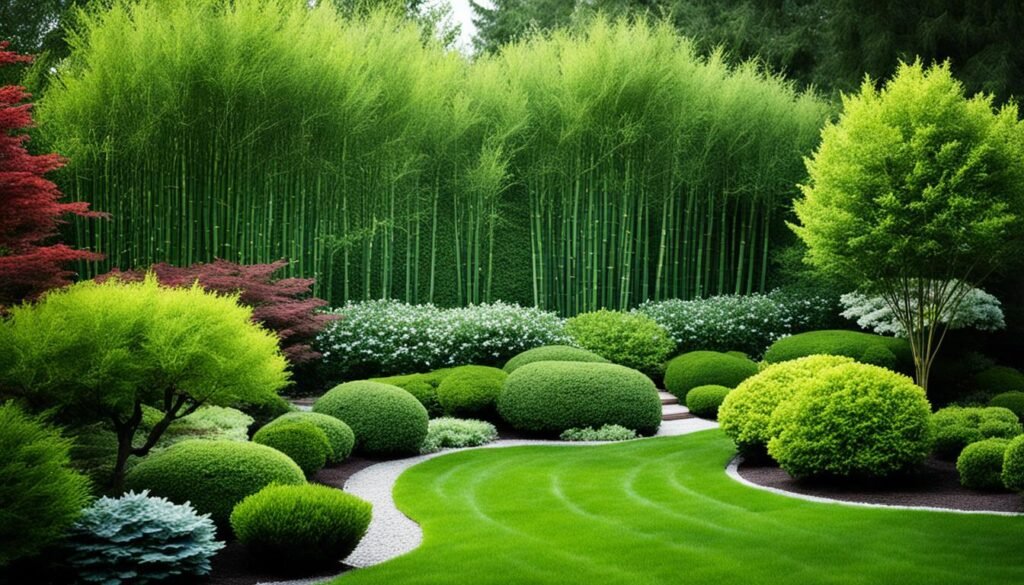
Plants to Hide Garden Boundaries and Create Privacy
If you’re looking to create privacy in your garden and hide the boundaries, there are several plants that can help you achieve this. By strategically positioning these plants, you can not only create a secluded and private outdoor space but also enhance the beauty of your garden. Let’s explore some ideas for using privacy plants to transform your outdoor oasis.
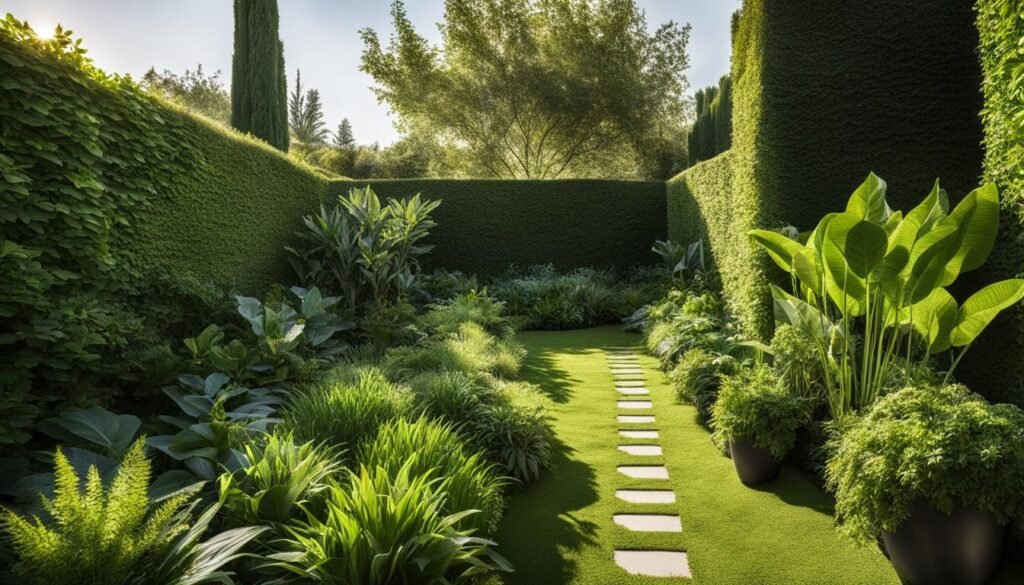
1. Evergreen Hedging Plants
Evergreen hedging plants are a popular choice for creating a natural and visually appealing privacy screen. These plants retain their foliage throughout the year, ensuring year-round privacy. Some popular options for evergreen hedges include Thuja Green Giant, Leyland Cypress, and Emerald Green Arborvitae. These fast-growing and dense plants can be spaced to create a continuous hedge that hides garden boundaries effectively.
2. Flowering Shrubs
While evergreen hedges provide privacy, incorporating flowering shrubs can add color and visual interest to your garden. These shrubs not only create a beautiful backdrop but also attract pollinators, adding vibrancy to your outdoor space. Consider planting shrubs like Hydrangeas, Rhododendrons, or Lilacs along the boundaries of your garden to create a privacy screen that blooms.
3. Bamboo
Bamboo is another excellent option for hiding garden boundaries and creating privacy. Known for its rapid growth and dense foliage, bamboo can quickly form a lush green screen. However, it’s essential to choose non-invasive species of bamboo to prevent it from spreading and becoming a nuisance. Clumping bamboo varieties, such as Bambusa multiplex or Fargesia, are ideal choices for creating a beautiful and contained privacy screen.
“By strategically positioning privacy plants in your garden, you can create a secluded and private outdoor space while enhancing its aesthetic appeal.” – Bob Smith, Landscape Designer
With these plants, you can create a secluded and peaceful environment within your outdoor space. Whether you choose evergreen hedging plants, flowering shrubs, or bamboo, these options will not only provide the privacy you desire but also add beauty and charm to your garden. Experiment with different plant combinations to create a unique and personalized garden screen that suits your style and preferences.
Best Screening Plants for Fence Privacy with Dense Green Screen
When it comes to creating a dense green screen for fence privacy, certain plants excel in this role. Explore options like arborvitae, bamboo, and privet that form thick and lush foliage, effectively blocking the view and providing maximum privacy. These plants are perfect for creating a private outdoor oasis.
Arborvitae
One of the best choices for screening plants for fence privacy is Arborvitae. This evergreen tree has dense foliage that grows in a narrow, pyramidal shape, making it an excellent choice for adding privacy to your yard. With its vibrant green color and ability to grow up to 50 feet tall, Arborvitae provides a natural and visually appealing privacy screen.
Bamboo
Bamboo is another popular option when it comes to creating a dense green privacy screen. Known for its fast growth and thick foliage, bamboo can quickly transform your outdoor space into a secluded oasis. Whether you choose clumping bamboo or running bamboo, this versatile plant provides an excellent barrier that effectively blocks views and sound.
Privet
Privet is a versatile and hardy shrub that is commonly used as a privacy hedge. With its dense, glossy leaves and fast growth rate, privet creates a thick green screen that adds both privacy and beauty to your fence line. It can be easily pruned and shaped to fit your desired height and width, making it an ideal choice for creating a dense privacy screen.
By selecting screening plants for fence privacy like arborvitae, bamboo, and privet, you can create a dense green screen that effectively blocks views and provides maximum privacy. These plants not only add beauty and vibrancy to your outdoor space but also create a peaceful and secluded atmosphere in your yard. Consider these options when looking for privacy fence ideas for your outdoor oasis.
| Plant | Height | Growth Rate | Foliage | Benefits |
|---|---|---|---|---|
| Arborvitae | Up to 50 feet | Medium | Dense, vibrant green | Natural and visually appealing privacy screen |
| Bamboo | Varies (up to 70 feet) | Fast | Thick, vibrant green | Fast-growing and excellent barrier for privacy |
| Privet | Varies (up to 15 feet) | Fast | Dense, glossy green | Easily pruned and shaped for desired height and width |
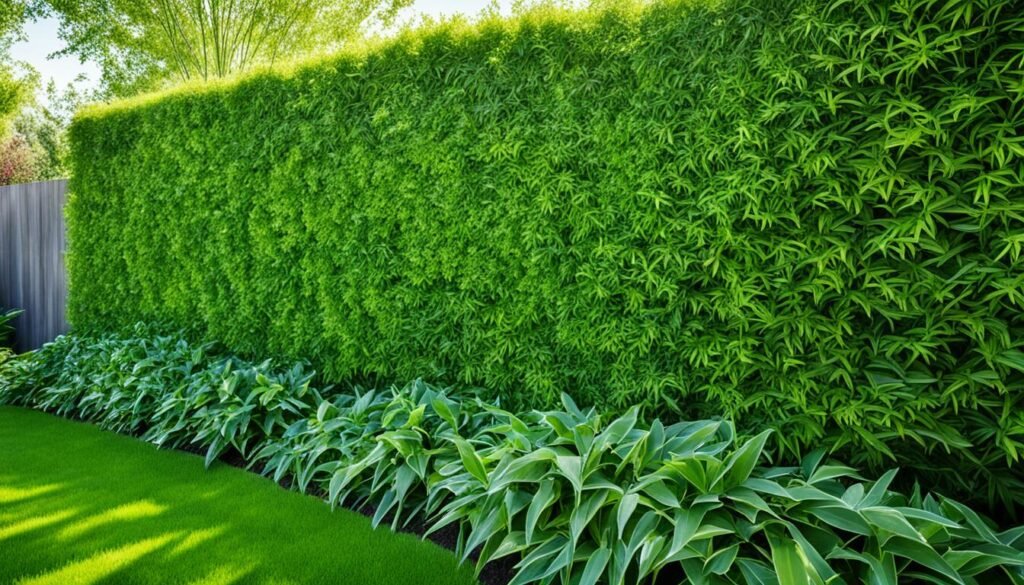
“Having a dense green screen of plants can create a private outdoor oasis, shielding your yard from prying eyes and providing you with the tranquility you desire.”
Best Grasses to Use as Screening Plants
When it comes to creating privacy in your garden, don’t overlook the beauty and functionality of ornamental grasses. These grasses not only provide a natural screen but also add texture, movement, and visual interest to your outdoor space. Here are some of the best grasses to use as screening plants:
Maiden Grass
Maiden grass (Miscanthus sinensis) is a popular choice for screening due to its tall, feathery plumes and graceful arching foliage. It can reach heights of up to 6-8 feet, making it an excellent option for creating a tall and elegant privacy screen. Maiden grass is also known for its resistance to pests and diseases, making it a low-maintenance choice for your garden.
Fountain Grass
Fountain grass (Pennisetum alopecuroides) is another fantastic option for adding privacy to your outdoor space. With its upright clumps of slender foliage and fluffy, bottlebrush-like flowers, fountain grass adds a touch of whimsy and beauty to any garden. It typically grows to about 3-5 feet in height, making it a great choice for a medium-sized privacy screen.
Switchgrass
Switchgrass (Panicum virgatum) is a versatile and adaptable grass that works well as a screening plant. Its tall, upright form and dense foliage provide an effective way to create privacy in your garden. Switchgrass comes in a variety of heights, ranging from 3 to 6 feet, allowing you to choose the right size for your desired screening needs. It also offers attractive fall color, adding visual interest to your landscape.
| Grass Type | Height | Characteristics |
|---|---|---|
| Maiden Grass | 6-8 feet | Feathery plumes; graceful arching foliage |
| Fountain Grass | 3-5 feet | Upright clumps; bottlebrush-like flowers |
| Switchgrass | 3-6 feet | Tall, upright form; dense foliage; attractive fall color |
These grasses for screening plants not only provide privacy but also create a natural and visually appealing backdrop for your outdoor oasis. Consider incorporating them into your garden design to enjoy the beauty and functionality they bring. 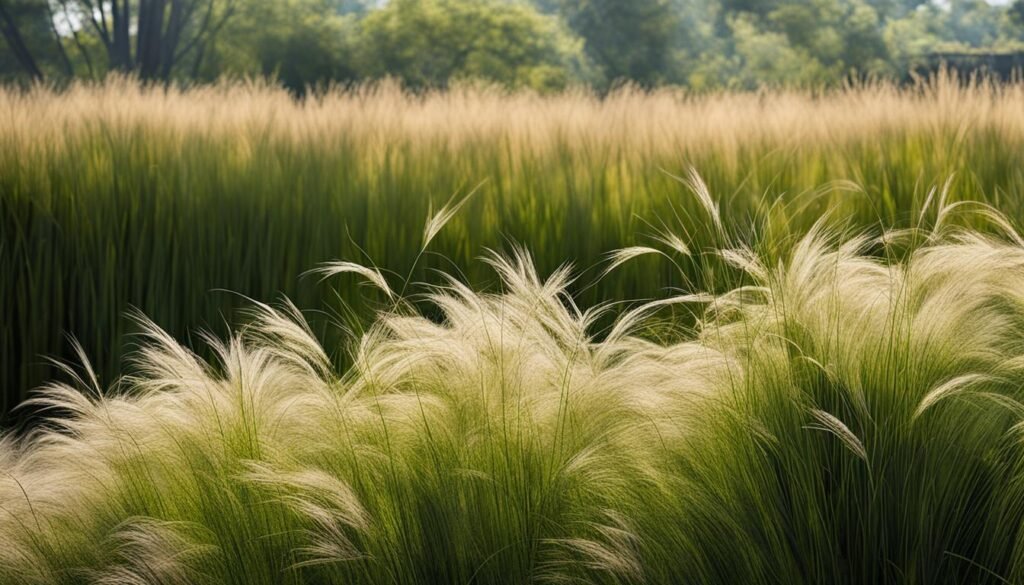
Best Plants for Privacy to Create a Semi-Transparent Screen
If you’re searching for a privacy solution that strikes a balance between visibility and seclusion, consider incorporating plants with a more open structure. By selecting options like bamboo, yew, and boxwood, you can create a semi-transparent screen that offers glimpses of the outside world while still maintaining a level of privacy.
These plants can be strategically pruned to create a more see-through effect without compromising privacy. The semi-transparency they provide will lend an airy and open feel to your outdoor space, allowing natural light to filter through while still shielding you from prying eyes.
With their delicate foliage and graceful branches, bamboo, yew, and boxwood add visual interest to any landscape. They can be used as standalone specimens, as part of a hedge, or incorporated into a mixed planting scheme to create a picturesque and functional privacy screen.
When properly spaced and maintained, these plants will create a sense of privacy throughout the year, even in winter when deciduous options may lose their leaves. This ensures that your outdoor space remains shielded and secluded in every season.
Whether you’re looking to create an intimate seating area or a hidden nook in your garden, these semi-transparent plants provide an ideal solution. By blending the best of both worlds, they offer the privacy you desire while allowing glimpses of the surrounding landscape.
Take a look at the image below to visualize how these plants can create a semi-transparent screen:
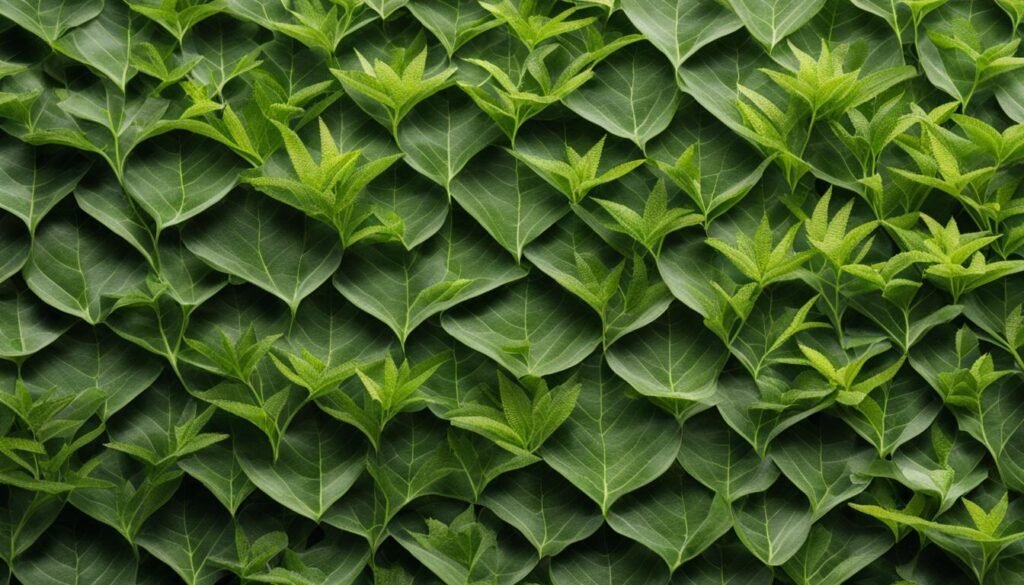
Benefits of Semi-Transparent Privacy Plants:
- Allow some natural light to filter through, creating a bright and airy ambiance
- Add an aesthetic appeal with their delicate foliage and elegant structure
- Offer glimpses of the outside world, maintaining a connection to the surrounding landscape
- Provide a level of privacy, shielding you from curious onlookers
- Work well in various garden styles, from contemporary to traditional
Semi-Transparent Privacy Plant Recommendations:
| Plant | Scientific Name | Key Features |
|---|---|---|
| Bamboo | Bambusoideae | Fast-growing, can be pruned to control height, creates a delicate screen |
| Yew | Taxus baccata | Evergreen, dense foliage, responds well to pruning and shaping |
| Boxwood | Buxus | Compact and versatile, can be pruned into various shapes, glossy leaves |
These plants offer a graceful and semi-transparent solution for creating privacy in your outdoor space. By incorporating them into your landscaping, you can strike the perfect balance between seclusion and openness, enjoying a serene and visually appealing environment.
Best Plants for Privacy for Screening from Above
If you’re looking to create privacy from above, there are specific plants that are perfect for this purpose. Vines like clematis, jasmine, and honeysuckle can be trained to grow on trellises or pergolas, creating a lush and green privacy screen from an elevated position.
These stunning vines add vertical interest to your outdoor space while creating a unique and secluded atmosphere. Whether you have a pergola that needs some privacy or want to enhance the beauty of your trellis, these plants are an excellent choice.
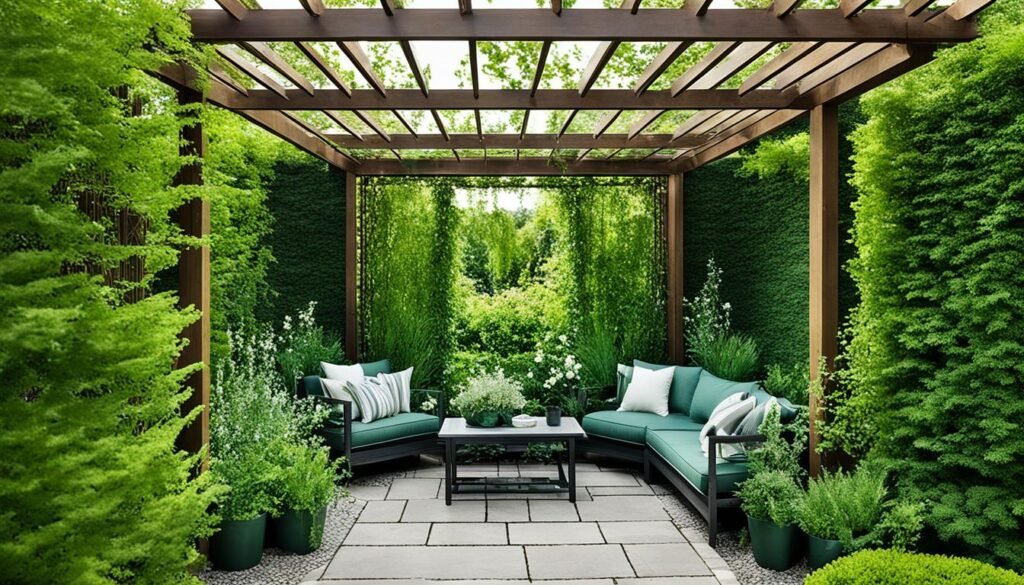
Benefits of Using Vines for Privacy from Above
- Vines provide a natural and visually appealing privacy screen.
- They add aesthetic appeal and vertical interest to your outdoor space.
- Their growth habit allows them to cover large areas quickly.
- They offer shade and can help cool down your outdoor area.
- These plants attract pollinators like bees and butterflies, enhancing the biodiversity of your garden.
If you want to create a private and inviting atmosphere in your outdoor space, consider using vines like clematis, jasmine, and honeysuckle. These plants not only provide privacy from above but also add beauty and charm to your garden.
| Vine | Botanical Name | Growth Habit | Hardiness Zone |
|---|---|---|---|
| Clematis | Clematis spp. | Climbing | Depends on variety |
| Jasmine | Jasminum spp. | Climbing | Depends on variety |
| Honeysuckle | Lonicera spp. | Twiners | Depends on variety |
A lush and green privacy screen from an elevated position can transform your outdoor space into a secluded oasis. By utilizing vines like clematis, jasmine, and honeysuckle, you can create a visually appealing and private atmosphere that enhances the overall beauty of your garden.
Vine Plants for Privacy
If you’re looking for a vertical and climbing approach to privacy in your outdoor space, vine plants are an excellent choice. These plants can be trained to grow on walls, fences, or trellises, creating a stunning green backdrop and adding a touch of elegance to your surroundings. Not only do they provide privacy, but they also enhance the aesthetic appeal of your garden.
There are several vine plants that are perfect for creating a private oasis. Ivy, with its lush foliage and ability to cling to surfaces, is a popular choice. Its dense growth pattern can effectively hide unsightly areas and create a visually pleasing screen. Wisteria is another beautiful option, known for its gorgeous cascading blooms and fast growth. Climbing roses add a touch of romance and beauty to any outdoor space, with their stunning colorful flowers and delightful fragrance.
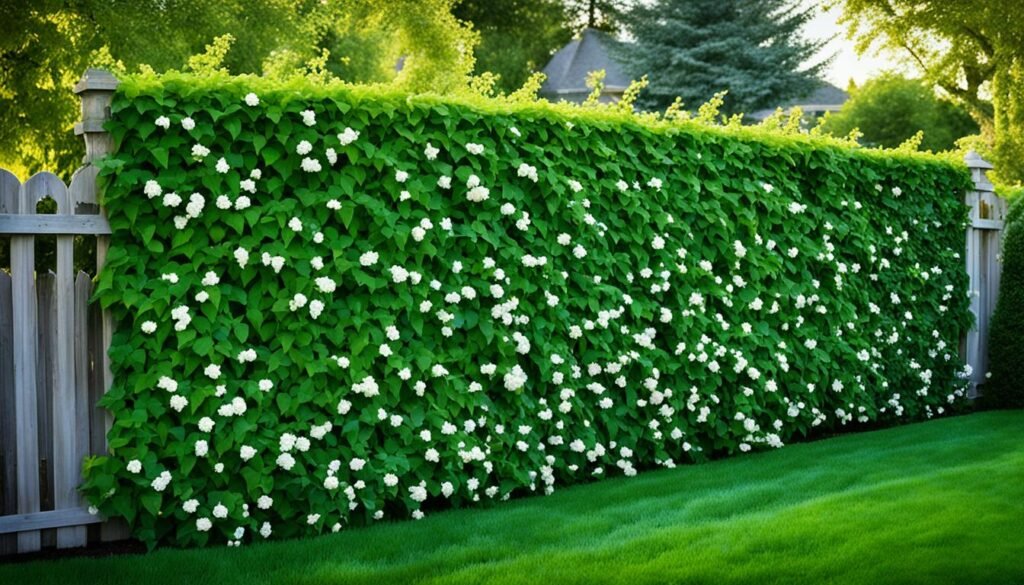
Vine plants also have the added benefit of attracting birds and butterflies to your garden. These delightful visitors will not only bring life and movement to your space but also contribute to the overall biodiversity of your garden ecosystem.
When planting vine plants for privacy, it’s essential to choose the right support structures, such as sturdy trellises or fences, to guide their growth. Regular pruning and training will help maintain their desired shape and prevent them from becoming overgrown. With proper care and maintenance, vine plants can provide you with a beautiful and private outdoor sanctuary.
Statement Plants for Privacy
If you’re looking to create a bold and eye-catching statement with your privacy plants, consider incorporating unique and visually stunning options into your outdoor space. These statement plants not only provide the privacy you desire but also add a touch of drama and visual interest to your garden.
One remarkable option is pampas grass. With its tall plumes and graceful, feathery appearance, pampas grass creates a striking focal point in any garden. Its towering presence and soft, flowing texture make it a perfect choice for enhancing privacy while adding a touch of elegance. Although primarily known for its visual appeal, pampas grass also offers an added benefit—it attracts birds and butterflies, bringing life and movement to your outdoor oasis.
“Pampas grass’s tall plumes and graceful, feathery appearance create a striking focal point in any garden.”
Another unique option is giant rhubarb. With its oversized, umbrella-like leaves, giant rhubarb gives your garden a tropical and exotic touch. Its large, dramatic presence instantly catches the eye and adds a wow factor to your outdoor space. As a privacy plant, giant rhubarb’s broad leaves provide an effective screen, ensuring complete privacy from prying eyes. This statement plant is not only functional but also visually captivating, making it an excellent choice for those who want their garden to be anything but ordinary.
“Giant rhubarb’s oversized, umbrella-like leaves give your garden a tropical and exotic touch, adding a wow factor to your outdoor space.”
For a touch of drama and a bold statement, elephant ears is an excellent choice. With its large, heart-shaped leaves and unique texture, elephant ears create a lush and tropical atmosphere. Whether grown in pots or planted directly in the ground, these plants provide a dense screen that ensures privacy while adding a sense of adventure to your garden. The striking foliage of elephant ears makes them a conversation starter and an impressive addition to any outdoor space.
“Elephant ears create a lush and tropical atmosphere, providing a dense screen that ensures privacy while adding a sense of adventure to your garden.”
These statement plants not only fulfill the practical need for privacy but also elevate the overall aesthetic of your outdoor space. Their unique features and visual appeal make them standout choices for creating a focal point in your garden. By incorporating these statement plants into your landscape, you can transform your outdoor space into a private haven that exudes style and personality.
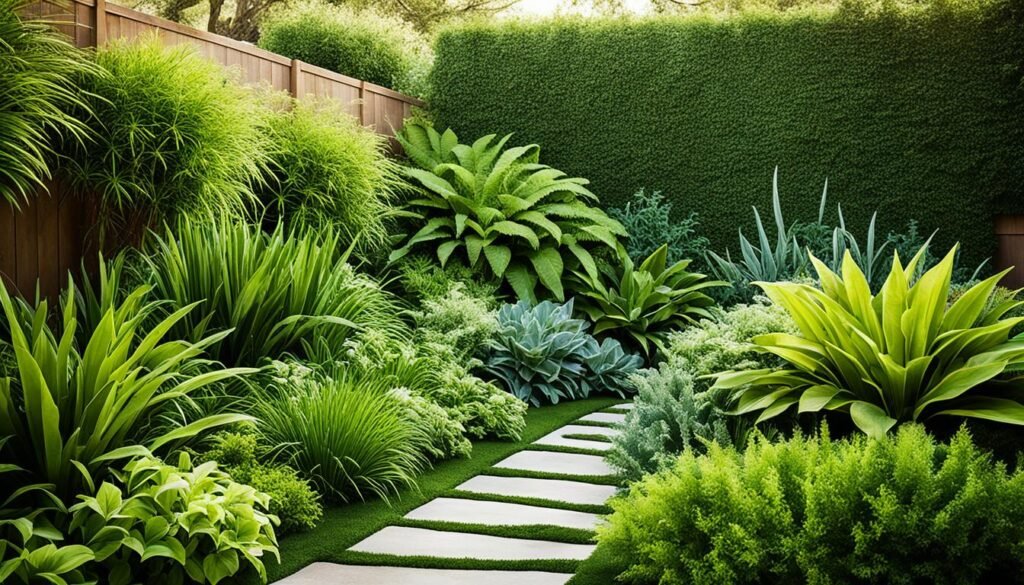
| Plant | Features | Benefits |
|---|---|---|
| Pampas Grass | Tall plumes, feathery appearance | Adds drama and attracts birds and butterflies |
| Giant Rhubarb | Oversized, umbrella-like leaves | Creates a tropical and exotic atmosphere |
| Elephant Ears | Large, heart-shaped leaves | Adds a touch of adventure and creates a lush environment |
Fast Growing Plants for Privacy That Spread Quickly
Creating a private and secluded oasis in your outdoor space doesn’t have to take years of waiting. With fast-growing plants for privacy that spread quickly, you can enjoy the benefits of instant screening and privacy. These plants are known for their rapid growth and ability to fill in space efficiently, providing you with the desired privacy in no time.
One option for fast-growing privacy plants is bamboo. Bamboo is not only known for its impressive growth rate but also its ability to form dense clumps that effectively block out prying eyes. Whether you opt for running or clumping bamboo varieties, you can expect a lush and green privacy screen that grows rapidly.
Another excellent choice is arborvitae. This evergreen shrub is popular for its fast growth and dense foliage, making it ideal for creating a privacy hedge. With its upright and compact form, arborvitae can quickly fill in space and provide a reliable barrier for your outdoor sanctuary.
If you’re looking for a fast-growing plant that offers year-round privacy, skip laurel is a great option. Skip laurel has large, glossy leaves that form a dense screen, creating a private retreat in your backyard. Whether you’re looking to hide an unsightly view or block out nosy neighbors, skip laurel can quickly provide the solution.
For a visual representation of these fast-growing privacy plants, take a look at the table below:
| Plant | Growth Rate | Characteristics |
|---|---|---|
| Bamboo | Fast | Dense clumps, rapid growth |
| Arborvitae | Fast | Evergreen, compact form |
| Skip Laurel | Fast | Large glossy leaves, year-round privacy |
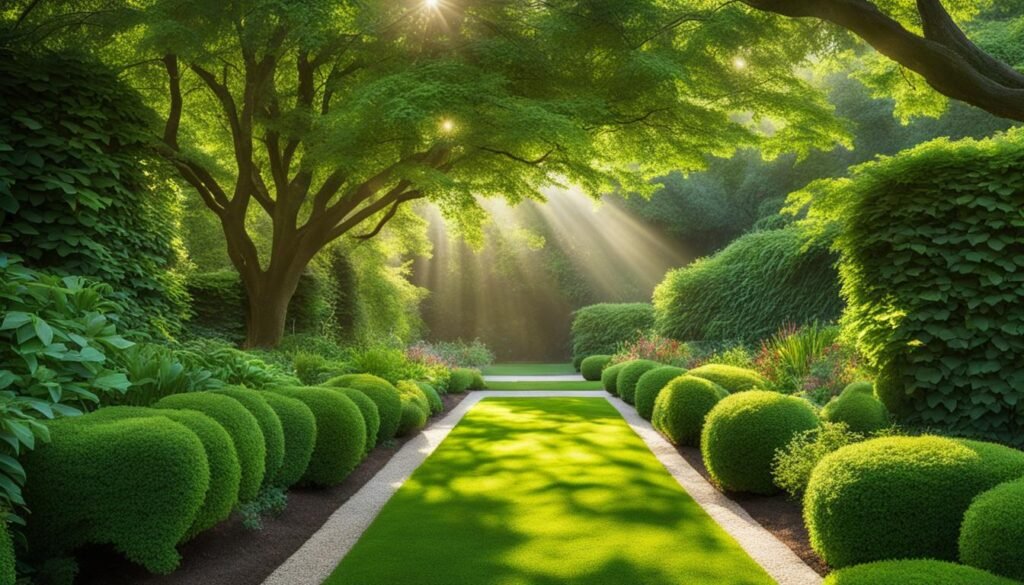
With these fast-growing plants for privacy, you can transform your outdoor space into a private oasis in no time. Whether you choose bamboo, arborvitae, skip laurel, or a combination of these plants, you’ll enjoy a lush and secluded environment where you can unwind and relax.
How to Grow Plants for Privacy? Step By Step
To create a private and secluded outdoor space, it’s important to know how to grow plants for privacy effectively. In this step-by-step guide, I’ll walk you through the process of selecting, planting, and caring for privacy plants to ensure they thrive and provide the desired level of screening in your garden.
Selecting the Right Plants
The first step in growing plants for privacy is selecting the right ones for your specific needs. Consider factors such as the desired height and spread of the plants, their growth rate, and the climate and soil conditions in your area. Some popular options for privacy plants include arborvitae, bamboo, and laurel. Do your research and choose plants that align with your preferences and garden requirements.
Preparing the Soil
Once you have chosen your privacy plants, it’s crucial to prepare the soil before planting. Clear the area of any weeds or unwanted vegetation and loosen the soil with a garden fork or tiller. Add organic matter such as compost or well-rotted manure to improve soil fertility and drainage. This will create a favorable environment for the plants to establish and thrive.
Planting the Privacy Plants
When it comes to planting privacy plants, follow these steps:
- Dig a hole that is twice as wide and just as deep as the root ball of the plant.
- Gently remove the plant from its container and tease out the roots if they are tightly bound.
- Place the plant in the hole, ensuring that it is planted at the same depth as it was in the container.
- Backfill the hole with soil, firming it gently around the plant to eliminate air pockets.
- Water the plant thoroughly to help settle the soil and promote root establishment.
Caring for Privacy Plants
After planting, it’s important to provide proper care for your privacy plants to ensure their healthy growth. Here are some essential care tips:
- Watering: Regularly water the plants, especially during dry periods, to keep the soil consistently moist. Avoid overwatering as it can lead to root rot.
- Fertilizing: Apply a balanced slow-release fertilizer in spring to provide essential nutrients for plant growth. Follow the instructions on the fertilizer packaging for proper application.
- Pruning: Trim and prune your privacy plants regularly to maintain their desired shape and size. Remove any dead or damaged branches to promote healthy growth.
- Pest and Disease Control: Monitor your plants for any signs of pests or diseases and take appropriate measures to control them. This can include using organic insecticides or seeking professional advice if required.
- Winter Protection: In colder climates, protect your privacy plants from harsh winter conditions by applying a layer of mulch around the base of the plants. This will help insulate the soil and protect the roots from freezing temperatures.
Achieving a Beautiful and Private Garden
By following these step-by-step guidelines, you can grow plants for privacy successfully and create a beautiful and private garden space. Remember to choose the right plants, prepare the soil adequately, plant with care, and provide proper ongoing maintenance. With time and dedication, your privacy plants will flourish, transforming your outdoor space into a tranquil oasis.
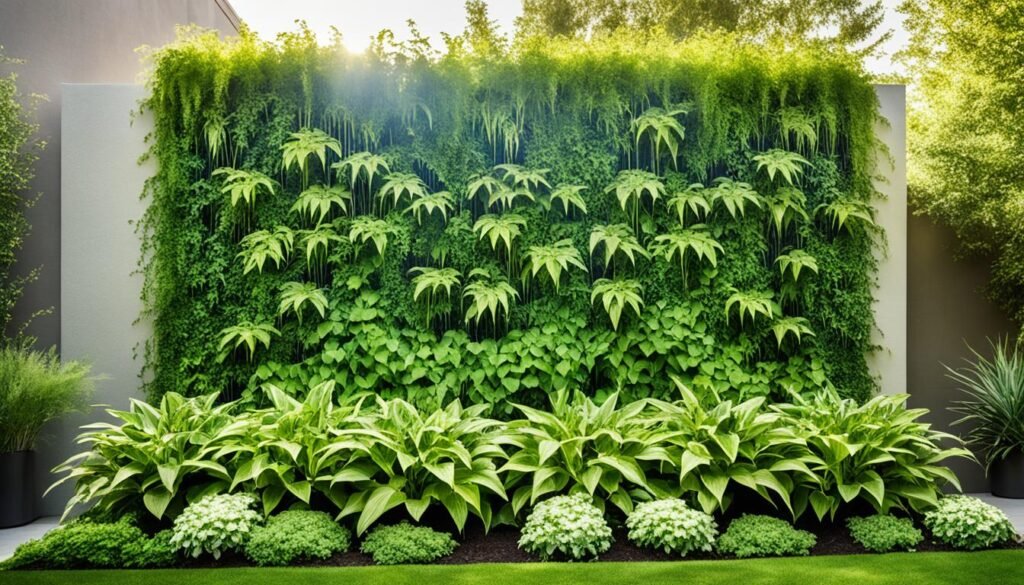
| Step | Action |
|---|---|
| 1 | Select the right plants for your specific needs and garden requirements. |
| 2 | Prepare the soil by clearing weeds, loosening it, and adding organic matter. |
| 3 | Dig a hole, place the plant at the same depth, backfill, and water thoroughly after planting. |
| 4 | Regularly water, fertilize, prune, and protect privacy plants from pests, diseases, and winter conditions. |
Conclusion
Creating privacy in outdoor spaces is crucial for establishing a tranquil and serene environment. By exploring unique screening plant ideas, you can seamlessly merge aesthetic appeal with privacy, resulting in a functional and beautiful outdoor oasis. Whether you prefer fast-growing plants for immediate results, evergreen hedges for year-round screening, or statement plants to make a bold statement, there is a wide range of options to suit your personal style and needs. The key is to choose the plants that resonate with you and transform your outdoor space into a private haven.
By strategically incorporating screening plants, you can enjoy the benefits of privacy in your outdoor spaces. These plants not only provide a sense of seclusion but also contribute to the overall beauty of your landscape. Whether you desire a dense green screen, a semi-transparent barrier, or privacy from an elevated position, there are numerous plants that can help you achieve your vision.
Remember, when selecting screening plants, consider factors such as the growth rate, maintenance requirements, and suitability for your climate. Plan your garden layout, taking into account your specific needs for privacy and the desired aesthetic. With a thoughtful approach and careful consideration of your options, you can create a private oasis where you can relax, entertain, and enjoy the beauty of nature.
